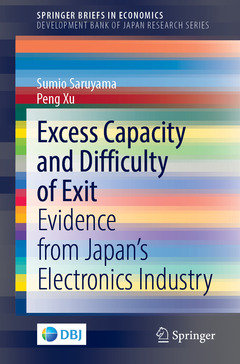Excess Capacity and Difficulty of Exit, 1st ed. 2021 Evidence from Japan’s Electronics Industry Development Bank of Japan Research Series
Auteurs : Saruyama Sumio, Xu Peng

This book provides cases and analyses of causes and consequences of difficulty in downsizing and exiting in the electronics industry during the ?two lost decades? in Japan. Because of excess capacity in the industry, many electronics companies have been required for downsizing and exit since the 1990s. Exploiting corporate financial and segment datasets, it shows empirical evidence of misallocation of internal funds to ?zombie? segments?intra-firm businesses suffering losses consecutively. The topics addressed in the book include the failure of Japanese corporate internal control systems, the lack of capital market pressure, employment protection, and misallocation of internal funds to businesses with few prospects. The last two decades indicate that the Japanese corporate governance systems have failed to resolve problems of excess capacity, as did US systems in the 1980s. Zombie lending is no more than one phase of the difficulty of downsizing and exit in response to excess capacity in the banking sector. Supported by both data analyses and rich anecdotal evidence, this book is highly recommended to readers who seek a convincing and comprehensive explanation of Japan's two lost decades from the points of view of difficulty in downsizing and exit. The authors? analyses have implications not only for accelerating downsizing and exit in corporate Japan, but also for the world economy.
Peng Xu is a professor at Hosei University, Tokyo, where he teaches corporate finance and corporate governance. His areas of expertise include hedge fund activism, corporate restructuring, and corporate governance. Dr. Xu is the author of numerous corporate finance and governance articles that have appeared in academic journals in economics, including the Journal of Japanese and International Economies, Japan and the World Economy, Journal of Restructuring Finance, and Journal of Financial Markets. He received the M&A Forum Award 2016 as a chapter author. He was a faculty fellow of the Research Institute of Economy, Trade and Industry during 2003–2006. He has served on several journal editorial boards, including as an editor of the Journal of Economic Policy Studies and the Law and Economics Review. He received his Ph.D. in economics from The University of Tokyo and his B.A. in social engineering from the University of Tsukuba.
Sumio Saruyama is a lead economist of the Japan Center for Economic Research (JCER). He received his B.A. from The University of Tokyo. He studied at Harvard University in 1985–1986. and received his Ph.D. in economics from Hosei University in 2018 for his research on exit behavior of troubled firms. At JCER, he is involved in analysis and policy recommendations on structural issues in the Japanese economy, such as the declining birthrate and aging population, public finance, and trade policies.
Date de parution : 09-2021
Ouvrage de 106 p.
15.5x23.5 cm



